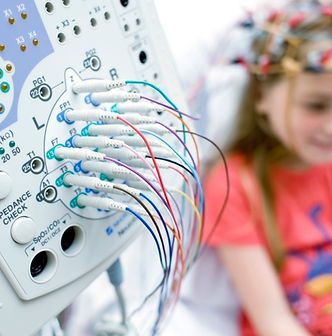
Understanding the Temporal Lobe: Its Role in c Language, Memory, and Autism
- Reign-Bow

- Aug 30, 2024
- 3 min read
The human brain is a complex and intricate organ, with different regions playing specialized roles in our daily lives. Among these, the temporal lobe is particularly important, as it governs critical functions like language, memory, and emotion. Understanding the temporal lobe’s role, especially in the context of Autism Spectrum Disorder (ASD), can provide valuable insights into how this region impacts behavior and cognitive abilities. In this blog post, we’ll explore the functions of the temporal lobe and its connection to autism, offering a glimpse into how neurological variations in this area may contribute to the challenges faced by individuals with ASD.
What is the Temporal Lobe?
The temporal lobe is one of the four major lobes of the brain, located on the sides of the brain near the temples. It is primarily responsible for processing auditory information, language comprehension, and the formation of long-term memories. This region also plays a key role in interpreting emotions and social cues, making it crucial for effective communication and interaction with others.
Key Functions of the Temporal Lobe
1. Language Processing: The temporal lobe houses the Wernicke’s area, which is essential for understanding spoken and written language. Damage or dysfunction in this area can lead to difficulties in language comprehension, a common challenge among individuals with autism.
2. Memory Formation: The temporal lobe, particularly the hippocampus, is involved in the creation and retrieval of long-term memories. This includes both declarative memories (facts and events) and procedural memories (skills and habits).
3. Auditory Processing: This lobe is crucial for interpreting sounds and speech, allowing us to understand and respond to auditory stimuli. In individuals with autism, differences in how the temporal lobe processes sounds can contribute to sensory sensitivities and communication difficulties.
4. Emotional and Social Cues: The temporal lobe also interacts with the amygdala to process emotions and recognize social cues. This interaction is vital for forming appropriate social responses and understanding the emotions of others, areas where individuals with autism often struggle.
The Connection Between the Temporal Lobe and Autism
Research has shown that the temporal lobe is one of the brain regions most affected by autism. Structural and functional differences in this area have been linked to the characteristic symptoms of ASD, such as challenges with language, memory, and social interactions.
1. Language Delays and Impairments: Many individuals with autism experience delays in language development or struggle with understanding and producing speech. Studies suggest that these challenges may be due to differences in how the temporal lobe processes language-related information.
2. Memory and Learning: While some individuals with autism exhibit exceptional memory skills, others may have difficulty with memory retention and retrieval. These variations may be related to differences in the hippocampal region of the temporal lobe, which plays a key role in memory formation.
3. Sensory Processing: Many individuals with autism have heightened sensitivities to sensory input, including sounds. The temporal lobe’s role in auditory processing may contribute to these sensory differences, leading to discomfort or overstimulation in noisy environments.
4. Social Interaction Difficulties: The temporal lobe’s involvement in processing social cues and emotions is critical for successful social interactions. Variations in this region may contribute to the challenges individuals with autism face in recognizing and responding to social signals.
Conclusion
The temporal lobe plays a vital role in many of the functions that are often disrupted in autism, including language, memory, and social interaction. By gaining a deeper understanding of how this brain region operates and how it differs in individuals with autism, we can develop more effective treatments and support strategies. As research continues to uncover the complexities of the temporal lobe and its connection to autism, we move closer to providing better care and improving the quality of life for those affected by this condition.






Comments